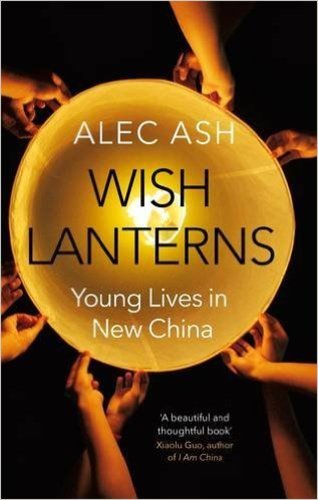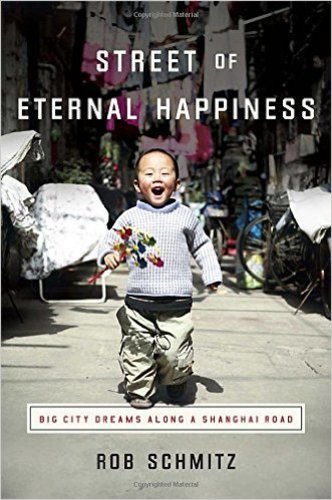Since Xi Jinping came to power in late 2012, the slogan “Chinese Dream” has been one of the guiding principles of the Chinese Communist Party. The way the Party sees it, the essence of the Chinese dream is national rejuvenation, or making China great again, so to speak. The vast propaganda apparatus has been mobilized to convince people in China that their own personal dreams are inextricably linked to the broader dream of a rising China.
But have the ubiquitous billboards and programs really had an affect in shaping the dreams of ordinary Chinese citizens?
Asia House, a London-based think tank recently tackled this question at a literary event, Chasing Dreams: The Common Man in China Today. They invited two authors, Alec Ash and Rob Schmitz to offer their take on what the Chinese dream means to ordinary Chinese. Alec Ash is the author of Wish Lanterns: Young Lives in New China. Rob Schmitz is the author of Street of Eternal Happiness: Big City Dreams along a Shanghai Road.
A written summary of the conversation can be found here (unfortunately, there is no audio). I want to highlight twelve key quotes that give us some helpful insights to better understand our Chinese friends and colleagues:
- “A generation in China can span just eight to 10 years because of the rapid economic change that has taken place in the country. People of every generation in China see the world in totally different ways,” (Schmitz)
- “The people on my street, when I asked them about the Chinese dream, they were busy dreaming their own dream,” (Schmitz)
- “There was a time for about 30 years when everyone was on the same page – to raise the country’s GDP. At that time the country and individuals had the same dream: to make money, but now people have gone beyond that, especially in places like Beijing and Shanghai. They are going beyond material wealth. They are dreaming about justice, religion, sending their children abroad. These dreams have gone far beyond what they used to be.” (Schmitz)
- “If Xi would like China to be stronger and a little bit more assertive, his definition of the dream on posters and murals, his idea is: ’you should participate in our vision for China, a stronger and assertive China, be a better citizen’ but on the ground level I think people are much more interested in the American kind of Chinese dream – eg the man who sells accordions in Rob’s book. There is, from what I have seen, an aspiration to transform not your country, but transform your life,” (Ash)
- 5. “Parents in today’s China don’t give great advice to kids as they simply don’t understand modern China.” “Lots of the new generation have to pretend they are taking advice from parents while doing opposite.” (Schmitz)
- “I feel there is a great desire for young Chinese to have a value system other than what the Government, their parents or their traditional culture has offered, in order to add value to their lives and give meaning to their lives, so there is a religious renaissance happening right now in China.” (Schmitz)
- “In cities now we are seeing people looking for something more than money, something beyond this mad grab for resources,” (Ash)
- “They want China to change and reform and improve on many levels – but they don’t want to totally change the system to achieve those goals or rock the boat,” (Ash)
- “At the bottom level people can be proud of their culture now too. It’s no longer topic non grata, unlike during the Cultural Revolution when people had to destroy it,” (Ash)
- “There is a love-hate relationship with the USA and the West now. Many young Chinese have travelled to US and the West, often studied there and so on, but when they come back they form their own opinions about what they like and don’t like and I think there is a need to dig deeper into their own culture as a result,” (Schmitz)
- “The people from Mao’s generation were all about taming the environment. Now there is more consciousness of protecting the planet and awareness that China has a big role to play.” (Schmitz)
- “Xi’s generation born in the 40s and 50s grew up in the Mao years where they survived a famine, and saw members of their family die and starve to death. Their mentality is one of survival. That’s how they see the world: we must survive. The young people in our books have a very different worldview and I think that will have a profound impact on China.” (Ash)
I have not yet read either of these books, but I’m heading over to Amazon right now to get them! Care to join me?

Joann Pittman
Joann Pittman is Vice President of Partnership and China Engagement and editor of ZGBriefs. Prior to joining ChinaSource, Joann spent 28 years working in China, as an English teacher, language student, program director, and cross-cultural trainer for organizations and businesses engaged in China. She has also taught Chinese at the University …View Full Bio
Are you enjoying a cup of good coffee or fragrant tea while reading the latest ChinaSource post? Consider donating the cost of that “cuppa” to support our content so we can continue to serve you with the latest on Christianity in China.

